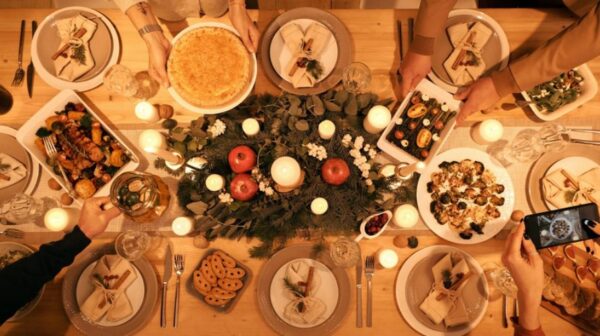Lifestyle
How to handle your first Christmas dinner as a new vegan

Christmas can be a seriously stressful time for vegans and their non-vegan families as they might have no idea what to cook or prepare for a vegan person especially if they are newly vegan.
Below are ways you can enjoy a meat-free Christmas.
1. Plan in advance
If you are having Christmas dinner at a family member’s house, let the host know in advance you are vegan and help them arrange options for you.
There are many vegan Christmas dinner options available in supermarkets, so finding something you like will not be difficult.
You can also bring dishes of your own to show people first-hand that being vegan is not as extreme or limiting as they may think.
Alternatively, why not host your own Christmas meal? This gives you control over what you serve and could open people’s minds to new and exciting Christmas dishes.
2. Play around with different ingredients
We are often too scared to play with what we have in the pantry. You can find out what you have and build the most amazing dishes with it. Like stuffed peppers, for instance – you can build the most amazing things with them.
3. You can also enjoy the braai
Tips for a vegan braai are to have a variety of salads like potato salad, coleslaw, rice salad and pasta salad (use egg-free mayonnaise), and do not add cheese, feta, or any meat to salads.
Make garlic bread with coconut oil and garlic. For the braai, you can find meat-free sausages, patties, or schnitzels at the supermarket.
They do not take long to cook and you will need to have them in an ovenproof dish or pan on the fire as vegans do not like their food touching a meaty grill.
4. Enjoy meaty flavours
Gone are the days when vegans were faced with bean burgers and falafel as their only options.
Now, major supermarkets stock realistic (and delicious!) meat-free chicken, turkey, tuna, and pork alternatives – ripe for the Christmas dinner picking. It has never been easier to make the swop.
5. Enjoy sweet treats, too
From mince pies to Christmas cake and to gingerbread cookies, there are plenty of tasty vegan recipes online that will also make your home smell wonderful.
6. Do not forget the seasoning
Like all good meals, seasoning is the key to enhancing your vegan dinner. Without seasoning your vegan roast can be a little bland, so ensure you use salt, pepper, garlic, and mixed herbs such as rosemary and thyme to your advantage.
You can coat your dishes with any of your favourite seasonings and olive oil to really bring out the overall flavour.
7. Perfect your gravy
Christmas is not Christmas unless it is drowned in gravy. But with a lot of great gravy recipes relying on butter and meat juices for flavour, what is a vegan to do?
We would urge you to stay away from gravy granules and store-bought vegan gravy as they are not as tasty. Instead, make your own gravy using the likes of veg juices, herbs, vegan red or white wine, vegetable stock, and a little Marmite (it gives it that extra kick).
Gravy can really pull the whole dinner together, after all, so make it next level.
8. Do your drinking research before you get drunk
Obviously, it is entirely up to how far you take your veganism. A lot of people turn a blind eye when it comes to drinking different wines or beers because it feels like too much hassle.
But if you want to go really strict, read up beforehand and be aware of the general trends that seem to happen with vegan and non-vegan alcohol.
There are a number of vegan wines on the market right now. How do you know if a wine is vegan? Drinks expert Melrick Harrison notes that when the wine is made, one of the processes used is a filtering and or a fining process.
Harrison notes that this process is there to remove any particles or impurities in wine that can negatively impact the flavour of wine before bottling.
“Fining wine means that there is an agent that gets added to wines. This pushes those impurities and particles towards the bottom of the barrel or tank, adding to sediment and murkiness that was already there.
“This is then removed at a later stage. However, it’s the agents used that will determine whether a wine is vegan or not,” he said.
Harrison explains that common fining agents used in non-vegan wines are gelatin (collagen taken from animal body parts), isinglass (fish), egg white (egg), casein (milk), arthropods (invertebrate animals), and others, while vegan fining agents will include bentonite (a type of clay), limestone, silica (quartz sand), carbon (charcoal) and vegetable gelatin (peas or potatoes).










